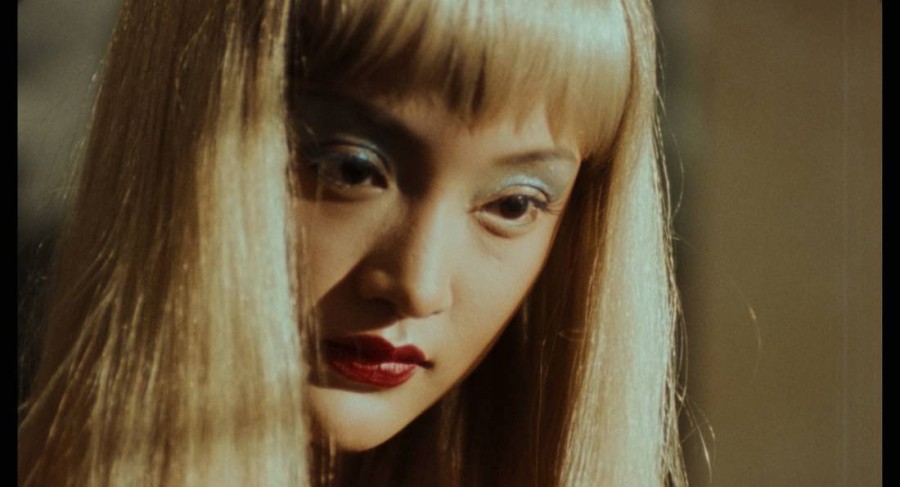Review: The 4K restoration of ‘Suzhou River’ enhances a fleeting urban fairy tale
Strand Releasing’s 4K restoration of Lou Ye’s arthouse romance “Suzhou River” gives new life to a modern classic, while retaining the film’s gritty essence. ‘Suzhou River’ began its theatrical run at Film Forum this Friday, Feb. 17.
February 22, 2023
Director Lou Ye’s urban fairy tale “Suzhou River” (2000) captures a short-lived love affair amid the thick smog of ‘90s Shanghai. Neon-lit debauchery, underworld criminal scheming and intimate connections are captured on a handheld camera by an anonymous narrator (Zhang Ming Fang) — an offscreen videographer caught between the forces of past and present. Through his lens, the film’s temporal structure and narrative perspective are manipulated. Like the retelling of a distant memory, facts become skewed and details get increasingly hazy as the scenes progress. Now, thanks to Strand Releasing’s 4K restoration, Lou’s quintessential tale of chasing nostalgia in the industrial sprawl will once again enchant a new generation of filmgoers.
Restored in Germany as part of the 2022 Berlinale Classics program, “Suzhou River” retains its characteristic roughness with its grainy Super-16 celluloid look and atmospheric soundscape. According to Angsar Frerich, recording mixer at Basis Berlin Postproduktion, Lou was actively involved in supervising the process. Lou constantly sent the team at Basis Berlin Postproduktion feedback, with a list of timecodes and suggested treatment. Unlike other restoration projects, which aim to polish images and sound in ultra high definition, this re-release holds on to its unpolished audiovisual texture — a quality that is essential to the film’s DNA.
Through the eyes of its lonesome protagonist, who is drifting on the murky waters of Suzhou river, the film presents an intertwining dual romance. The videographer’s girlfriend, Meimei (Zhou Xun), who performs as a blonde mermaid in a seedy nightclub, meets Mardar (Jia Hongsheng), an ex-convict who not only insists that they were once lovers, but also that she is an entirely different person — a shady vodka salesman’s daughter named Moudan.
What follows is a cryptic puzzle filled with both illusive flashbacks and a perplexing present. The mystique of the narrative is enhanced by the film’s industrial home-video aesthetic. Scenes feel like a collection of forgotten tapes, documenting an intense romance. This encapsulates Lou’s treatment of love as an ephemeral moment, a distant memory that still has a visceral hold on the viewer’s psyche. Love pushes characters to their emotional and psychological limits as they long for a reality that never was and never can be.
While “Suzhou River” is intrinsically distinct from the works of Wong Kar Wai, Lou shares a similar fascination with reconciling nostalgic impulses. The doomed relationships at the center of the film take place at the cusp of great political and cultural change. Mardar’s chase for his drowned lover in a rapidly changing metropolis embodies a collective fixation on past regrets and idealistic views of the future. Even now, Lou’s appeal to nostalgia resonates intensely. Although he made the film at the turn of the century — a period defined by anxieties regarding the future — a longing for how things could have been has never felt more universal.
Lou also calls into question the reliability of the camera as a narrative device. Often, the camera situates viewers in the position of a passive observer, ready to take in a story with a clear start and end. By presenting the diegesis from the perspective of a videographer, “Suzhou River” calls attention to the fakeness of movies. It is never clear if it’s the videographer behind the camera at all times, or if there are sections of flashbacks which are not shot through his point of view. It is entirely possible that the videographer’s account of the whole story is actually a reenactment put on by actors. In the opening scene of the movie, the videographer assures the audience that “cameras don’t lie,” yet throughout the film it is evident that the truth is either hidden from, or skewed by, the camera. In an age where realism is often the benchmark for great cinema, Lou’s narrative ambiguity and surreal imagery continues to defy the status quo.
Using “Suzhou River” as a vantage point to reflect on Chinese cinema in the new millennium, the raw authenticity of Sixth Generation filmmakers like Lou, who “significantly altered the structure of cinematic power and aesthetic expression,” seems to have all but dissipated in the face of rising censorship and greater emphasis on blockbusters over provocative independent cinema. While new million-dollar blockbusters are a sign of great technological innovation in Chinese film, it is hard to believe that just two decades ago, the industry was filled with luminaries like Lou who had such vibrant, singular and uncompromising visions for what national cinema could become. Perhaps, like the film’s depiction of love, the cinematic moment is just as ephemeral, and to chase a bygone era is a fruitless endeavor. As viewers, the best we can do is stay adrift and keep moving forward.
Contact Mick Gaw at [email protected].

























































































































































